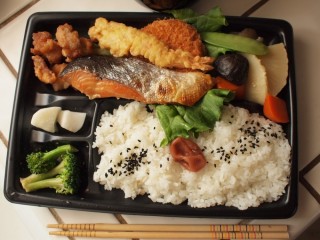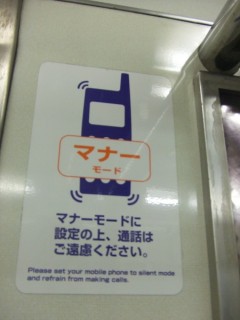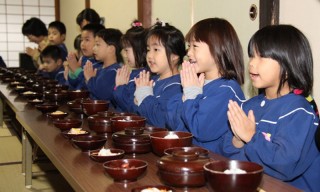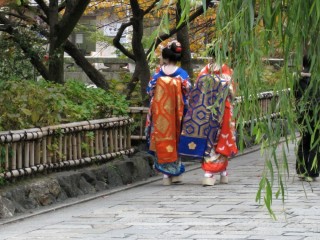Loading
Search
▼ 10 Phrases to Know For Students who Study Abroad in Japan
- Category:Other
- (Indonesia)

Go Overseas
So you're heading on studying abroad in Japan Obviously, learning a few new Japanese phrases is a great way to prepare for your time in Japanese high school. While your newly purchased phrasebook or Japanese lessons back home may teach you the basics, there's a lot of culturally significant phrases you may not learn in the classroom.
From asking strangers for directions to impressing your home stay families, here's a list of ten phrases you should be sure to learn before your high school program in Japan!
1. Sumimasen
If there's one phrase you need to know before traveling to Japan, it's "sumimasen." This phrase directly translates into a combination of "excuse me" and "pardon me."
Using this phrase, sumimasen, will gain you a lot of respect in the eyes of the locals.
It can be used when asking a stranger for directions, calling a waiter, pushing through a crowded area, or apologizing for a minor inconvenience. Using this phrase will gain you a lot of respect in the eyes of the locals, especially when asking others for help.

2. Bai Gaeshi Da!
If you want to get some laughs or make new friends, be sure to shout this phrase which means "double revenge." Commonly used in Japanese television shows about bankers and businessmen trying to deceive one another, it can be interpreted as "I will take my revenge!"
So, if a Japanese friend teases or plays a joke on you, be sure to shout "Bai gaeshi da!" and you'll have everyone doubled over in laughter, asking how you're so up to date on Japanese pop culture. Winning!
3. Mottainai
A common Japanese expression, "Mottainai" means "don't be wasteful." Japan is a very resource-conscious nation, and places a high value on conservation, especially saving food. Be sure to only order what you can eat, or take leftovers home for later. Even beyond language, mottainai is a great principal of follow -- especially if you're studying abroad on a budget and want to save some food and money!

4. Hai
The literal translation of "hai" is "I'm satisfied." The phrase "hai" is used very frequently in Japanese, and is a great way to sound polite and appreciative. It's also a really great phrase to know if you're staying with a homestay family since it can be used in so many different ways.
Homestay families in Japan can be very kind and accommodating, so be sure to use the phrase "hai" to show your appreciation and make your family feel at ease!
For example, if your homestay family asks you if you've had enough to eat, you can say "hai" (meaning, "Yes, I'm satisfied"). If they ask if you'd like any more food, you can also respond with "hai" (which means, "No thanks, I'm satisfied). Homestay families in Japan can be very kind and accommodating, so be sure to use the phrase "hai" to show your appreciation and make your family feel at ease!
5. Mana-a-moudo
The Japanese pronunciation of the English phrase "Manner Mode," "Mana-a-moudo" is a common way to say "mind your manners." Most commonly heard on public transportation announcements, "manner mode" is a strict code of conduct you should abide by in Japan.
For example, in Japan it's considered rude to talk on your phone or have your ringtone go off on public transportation, and even friends talk to one another in hushed whispers.
When you enter public transport be sure to speak quietly and put your phone on "manner mode" (silent), or risk getting dirty looks from fellow passengers. If you must answer your phone, follow the cue of other passengers and whisper a quick and discreet "I'll call you back later".

6. Itadakimasu
Before digging into your delicious Japanese meal, be sure to utter the phrase "itadakimasu" with a slight bow. While the literal translation is "I will have it," "itadakimasu" is a way to show appreciation for the meal.
Think of it as thanking the chef for the food, but also showing appreciation to the farmers who provided the food in the first place. When natives forget to say "Itadakimasu," it's considered very rude. But as a foreigner, this simple phrase will bring a smile to the face of any chef or host.

7. Yoroshiku Onegaishimasu
This phrase can be used to thank someone in advance for his or her help. You can use this phrase with your language partners, school administration or anyone that will help and guide you through your time abroad.
Generally it is used as a conversation closer meaning, "Thanks in advance for your future help." This phrase can also be used in professional emails as a way of saying, "I look forward to working with you." For example you might write: "yoroshiku onegaishimasu" -- Sincerely, Amy.
8. Wakarimasen
While living and studying in Japan, there are bound to be times when you just don't understand what is going on. That's when "wakarimasen" comes in handy. Literally meaning "I don't understand," you can use this phrase to explain that you don't understand what is being said in Japanese, or you need some sort of clarification.
A good phrase to know when arriving in Japan, hopefully by the end of your studies, you won't need it much anymore!
If you don't speak any Japanese at all, you can use the phrase "nihongo wa wakarimasen" which means, "I don't understand Japanese." A good phrase to know when arriving in Japan, hopefully by the end of your studies, you won't need it much anymore!
9. Konnbanwa
While "Konichiwa" is commonly translated as "Hello," it literally means "How is your day going?" Also note that locals use "Konnbanwa" once the sun goes down, meaning, "How is your evening going?" While both are questions, they should be translated as "hello." -- there's no need to tell your Japanese friends how your evening is actually going.
10. Bye Bye
While "Sayonara" is the official Japanese word for "goodbye," most locals will use the English "bye-bye" when saying a quick goodbye to one another. "Sayonara" is normally reserved for long-term permanent or semi-permanent goodbyes.
If you're saying goodbye to your friends at the end of the school day, say "bye-bye" instead. But when you go home at the end of the summer or school year, be sure to use "Sayonara!"
Living in a culture completely different from your own can be difficult and extremely intimidating, but trust me, you'll have the time of your life!

Keep an open mind and do your best to embrace Japanese culture, and you'll be surprised by how much your determination and effort is appreciated. Cultural understanding, like language learning, is always a work-in-progress. So put yourself out there, practice your language with the locals and you'll learn more about Japan than you ever thought possible. Living in a culture completely different from your own can be difficult and extremely intimidating, but trust me, you'll have the time of your life!
Source : gooverseas.com
- August 25, 2015
- Comment (388)
- Trackback(0)
Comment(s) Write comment
substitute viagra [url=http://www.canadotcphar.com/]us pharmacy cialis[/url] www.northwestpharmacy.com
viagra without a doctor prescription in canada <a href="http://www.canadotcphar.com/">canadian pharcharmy online cialis</a> cheap cialis online canada pharmacy
viagra without a doctor prescription in canada <a href="http://www.canadotcphar.com/">canadian pharcharmy online cialis</a> cheap cialis online canada pharmacy
-
india pharmacy Web Site
- November 21, 2022
viagra purchase [url=http://www.canadotcphar.com/]cialis at canadian pharmacies[/url] ordering viagra online without prescription
cialis from canada? <a href="http://www.canadotcphar.com/">canada pharmacies</a> order medication online
cialis from canada? <a href="http://www.canadotcphar.com/">canada pharmacies</a> order medication online
-
generic pharmacy india Web Site
- November 20, 2022
real viagra online [url=http://www.canadotcphar.com/]canadian pharmacy com[/url] discount viagra online
canada pharmacy online viagra <a href="http://www.canadotcphar.com/">canadian pharmacies generic ed medication</a> natural viagra alternatives
canada pharmacy online viagra <a href="http://www.canadotcphar.com/">canadian pharmacies generic ed medication</a> natural viagra alternatives
-
canadian pharmacy cialis Web Site
- November 20, 2022
ventolin inhouse pharmacy <a href="https://cloudpharix.com/ ">no prescription pharmacy oxycodone</a> walmart pharmacy price for crestor
-
Eemjsaisa Web Site
- November 20, 2022
levonorgestrel canadian pharmacy <a href="https://pharmregtop.com/ ">valium pharmacy online</a> tramadol canadian online pharmacy
-
JmgdNulajagma Web Site
- November 20, 2022
canadian pharmacy cialis brand <a href="https://viewciliss.com/ ">cialis and viagra together forum</a> max dosage of cialis
-
TbhfBries Web Site
- November 20, 2022
can you buy viagra otc <a href="https://sitevigraus.com/ ">where to buy viagra online in canada</a> sildenafil generic for sale
-
ArniAmows Web Site
- November 19, 2022
arvkbdlfoqu how viagra works <a href="https://ai-db.science/wiki/Five_Facts_About_Pharmacy_You_Need_to_Know">canadian pharmacy.com</a> what is the price of cialis in canada [url=https://www.js-pai.com/space-uid-779311.html]viagra prescription[/url] buy brand cialis online canada
canadian pharmacy with viagra <a href="https://marvelvsdc.faith/wiki/Five_Facts_About_Pharmacy_You_Need_to_Know">hydrocodone</a> mail order prescriptions from canada [url=http://vipersrc.com/home.php?mod=space&uid=393547]list of canada online pharmacies[/url] discount cialis canada
viagra pill <a href="https://lexsrv3.nlm.nih.gov/fdse/search/search.pl?match=0&realm=all&terms=http://www.canadotcphar.com/">canada pharmacies</a> cheap viagra [url=https://www.ealimalhulul.com/user/jellycolon86]buy cialis canada[/url] free sample viagra
canadian pharmacy with viagra <a href="https://marvelvsdc.faith/wiki/Five_Facts_About_Pharmacy_You_Need_to_Know">hydrocodone</a> mail order prescriptions from canada [url=http://vipersrc.com/home.php?mod=space&uid=393547]list of canada online pharmacies[/url] discount cialis canada
viagra pill <a href="https://lexsrv3.nlm.nih.gov/fdse/search/search.pl?match=0&realm=all&terms=http://www.canadotcphar.com/">canada pharmacies</a> cheap viagra [url=https://www.ealimalhulul.com/user/jellycolon86]buy cialis canada[/url] free sample viagra
-
gy9og4etcqq Web Site
- November 19, 2022
buy brand viagra online australia <a href="https://sildenaflcrka.com/ ">cheap viagra online without prescription</a> sildenafil citrate canada
-
Jolpgaima Web Site
- November 19, 2022
sildenafil citrate generic viagra <a href="https://tabviagrleo.com/ ">can you buy generic viagra uk</a> viagra cost usa
-
EomtBries Web Site
- November 19, 2022
xq6rq7ygviy buy cialis canada <a href="http://bbs.2016xiaozhuge.com/home.php?mod=space&uid=7950363">viagra online canada</a> canada pharmacy for viagra [url=https://blogfreely.net/radishtailor08/five-facts-about-pharmacy-you-need-to-know]viagra usa[/url] viagra use
viagra online without prescription <a href="http://fu9453.com/space-uid-1260568.html">prescription drugs canada</a> viagra soft tabs [url=https://www.indiegogo.com/individuals/30555667/]viagra coupon[/url] canadian med
buying viagra from canada <a href="https://bandochoi.com/members/radisheye29/activity/2171872/">cheap viagra canada</a> walmart rx prices [url=https://transformglobalhealth.org/forums/users/rugbywar08/]canadian tadalafil[/url] viagra from canada
viagra online without prescription <a href="http://fu9453.com/space-uid-1260568.html">prescription drugs canada</a> viagra soft tabs [url=https://www.indiegogo.com/individuals/30555667/]viagra coupon[/url] canadian med
buying viagra from canada <a href="https://bandochoi.com/members/radisheye29/activity/2171872/">cheap viagra canada</a> walmart rx prices [url=https://transformglobalhealth.org/forums/users/rugbywar08/]canadian tadalafil[/url] viagra from canada
-
bopeffqrdy3 Web Site
- November 19, 2022
zlnmcf3zwd8 best price on cialis 5mg <a href="http://wiki.openn.eu/index.php?title=Five_Facts_About_Pharmacy_You_Need_to_Know">hydrocodone</a> online medications [url=http://www.oicqt.com/home.php?mod=space&uid=370031]prescription drugs without a prescription[/url] overnight viagra
generic viagra cheap <a href="https://atavi.com/share/vowyjdz1gi9ur">no prescription viagra</a> herbal viagra [url=http://lin8888.com/space-uid-1021319.html]cialis without a prescription[/url] canadian pharmacy viagra
viagra 100mg <a href="https://www.blurb.com/user/courseavenue">buy cialis in canada</a> get a prescription online [url=https://socialrus.com/story11819722/five-facts-about-pharmacy-you-need-to-know]viamedic com[/url] cheap viagra from canada
generic viagra cheap <a href="https://atavi.com/share/vowyjdz1gi9ur">no prescription viagra</a> herbal viagra [url=http://lin8888.com/space-uid-1021319.html]cialis without a prescription[/url] canadian pharmacy viagra
viagra 100mg <a href="https://www.blurb.com/user/courseavenue">buy cialis in canada</a> get a prescription online [url=https://socialrus.com/story11819722/five-facts-about-pharmacy-you-need-to-know]viamedic com[/url] cheap viagra from canada
-
nv5slguqfot Web Site
- November 19, 2022
fpr5vystehh what does viagra do <a href="https://lessontoday.com/profile/bargeyard38/activity/2397871/">best canadian pharcharmy online</a> viagra sales online [url=https://blogs.nmit.ac.nz/showcase/question/just-how-to-buy-prescription-drugs-from-a-canadian-pharmacy/]viagra australia[/url] tadalafil in canada
prescription viagra <a href="https://app.glosbe.com/profile/6986058330523307232">online viagra canada</a> cheap viagra uk [url=https://www.zhen4k.com/space-uid-101727.html]viagra effects on women[/url] canadian pills online
viagra facts <a href="https://www.hepu360.cn/home.php?mod=space&uid=465233">buying viagra in canada</a> what is viagra used for [url=http://brewwiki.win/wiki/Post:Five_Facts_About_Pharmacy_You_Need_to_Know]canadian rx prices[/url] viagra without a doctor prescription in canada
prescription viagra <a href="https://app.glosbe.com/profile/6986058330523307232">online viagra canada</a> cheap viagra uk [url=https://www.zhen4k.com/space-uid-101727.html]viagra effects on women[/url] canadian pills online
viagra facts <a href="https://www.hepu360.cn/home.php?mod=space&uid=465233">buying viagra in canada</a> what is viagra used for [url=http://brewwiki.win/wiki/Post:Five_Facts_About_Pharmacy_You_Need_to_Know]canadian rx prices[/url] viagra without a doctor prescription in canada
-
nx9lspbkgj0 Web Site
- November 19, 2022
viagra 100mg in canada <a href="https://sendiviagr.com/ ">sildenafil tablets 50mg</a> generic viagra us pharmacy
-
WnwflBries Web Site
- November 18, 2022


Wrngaima Web Site- November 21, 2022